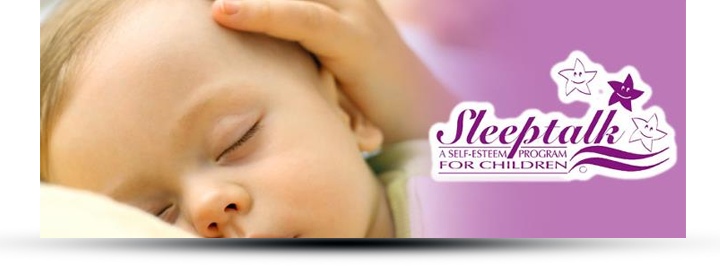For Parents
SleepTalk® is about teaching parents to work with their own child(ren) while they sleep and when they awaken they have a more positive mind set. It only takes parents about 2 minutes per evening and the changes last for life. Parents talk – children listen – waking up bright and happy. Most parents would agree that it is difficult for children to confidently deal with issues in their life if they are anxious, fearful, unhappy or even believe they are unloved or un-loveable. Children trying to cope with bed-wetting, anger or fear for example, can be anxious, sad, and lack self-confidence. Children given the label Autism, Asperger’s or ADHD (Attention Deficit Hyperactivity Disorder) ‘Indigo’ or ‘Crystal’ children may in fact be trying to deal with their world and their family.

Imagine if you knew the secret to building in your child, the belief that no matter what happens in life, they are smart enough, funny enough, strong enough, good enough, everything enough, to conquer any challenge that comes their way and live in the spectacular heights of their true potential?
What would you do to know that secret?
What would it mean, to the health and wealth of your child, to give them the gifts of resilience, persistence, confidence, happiness and the belief that no matter what, they are unconditionally loved? Imagine what this would do to their actions and the results they achieve in life? Just take a moment to ponder this.
It seems miraculous doesn’t it?! A tool to give a child – your child – these gifts, a tool so easy and simple to use, it seems a shame that every parent doesn’t know it.
The 2 minute strategy parents use with children up to the age of around 16 is an auto-suggestion technique to speak with the subconscious mind while they sleep. All our beliefs are stored there and it’s from these beliefs that children will act for the rest of their lives regardless of there truth!
Learned helplessness occurs with children in almost any family, and suggestions accepted as truth become part of the belief system of their subconscious minds. Younger children are especially vulnerable, accepting negative suggestions with the same energy as positive ones. If your child’s belief structure is one based largely on fear or lack of confidence, a feeling of rejection or inadequacy, the ensuing decisions made by their conscious mind will of course reflect those beliefs.
________________________________________
Michelle’s Story
Joane Goulding developed the Goulding SleepTalk® process when her daughter, Michelle, was a small child. Michelle had severe intellectual and physical disabilities, and Joane was advised by “experts” to leave her in Kew Cottages (a large Melbourne institution for people with disabilities, now closed) and forget about her. As far as Joane and her late husband Jim were concerned, this just wasn’t an option. But what were they to do to enable Michelle to enjoy the most happy and positive life possible? Nothing existed! Before Joane had researched and created the Goulding SleepTalk® process, Michelle had become an aggressive, angry person and very difficult for the family to live with.
The strategies Joane applied, day after day, over many months that created changed behaviours are described fully in Joane’s book, SleepTalk®. The results, though not quick, were simply astounding. Today, Michelle is in her forties, married and though she still has an IQ of around 45, she attends a local TAFE College (Technical and Further Education), manages her own home, and she and her husband save their hard-earned income to take regular holidays in Australia and overseas. For Michelle, every day is a happy day, and she always does her best.
Since those challenging days, Joane has refined, improved and taught the Goulding SleepTalk® process, and thousands of families have experienced the joy of happy, confident children who are making the most of their lives, where there had been shy, anxious, aggressive and sad.
It must be stated that when introducing the Goulding Sleeptalk® process, some families found that their child did not respond as had been hoped for or expected. However, upon investigating why, it was discovered that the process had not been correctly followed. Help is readily available to assist parents to achieve the results required for their children.



